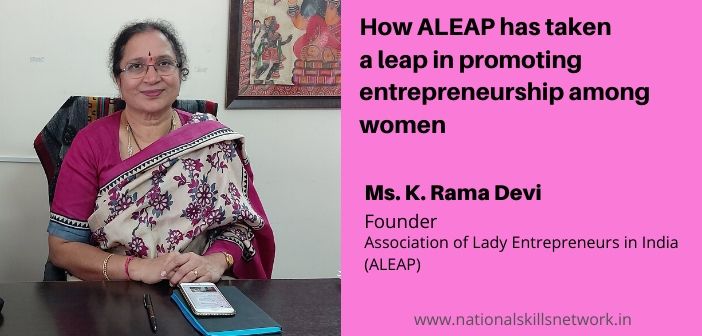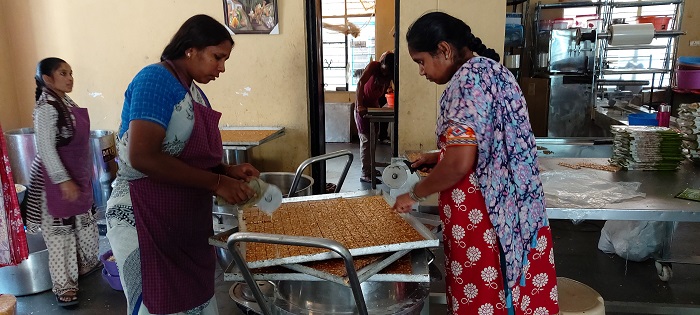Over the last decade, an increasing number of start-ups and new businesses have come up across India. For any small or big business to survive in the initial years, it needs the support of a strong institutional setup and a transparent mechanism. With an aim and vision to promote women entrepreneurs in the erstwhile Andhra Pradesh, Ms. K. Rama Devi started ALEAP – Association of Lady Entrepreneurs in India. ALEAP provides an incubation center for women entrepreneurs where they train in relevant skills, guide, support and enhance the lives of women who aspire to be entrepreneurs. We caught up with Ms. K. Rama Devi, Founder, ALEAP, to know her views on women entrepreneurs, entrepreneurship and apprenticeships. Here’s the Skill Story to tell you more.
Q: Could you tell us in brief about how ALEAP is promoting entrepreneurship among women?
A: ALEAP does not just promote or support only women from rural areas or women with less or no educational background. ALEAP supports anyone who wants to be an entrepreneur. Almost every day we get a lot of calls from B.Sc., B.Com. and other graduates enquiring about how to start their own venture. With initiatives like Start-up India, Atal Innovation Mission from the Central Government, everyone in India today wants to be an entrepreneur. This a great sign for the country. What we do at ALEAP is that we are channelizing this and providing information to them. We have an information desk, which we call as FAB (Facilitator Business Development) Cell. We provide all the information on that desk about both the small and the big projects. We have bankers, who can guide them about financial support and credit help. Every day there is at least one entrepreneur who gets a loan sanctioned for their venture through our intervention.
Apart from mentorship and banking support, we provide the women with the training, market linkages, space for their manufacturing or industrial unit, latest machinery and tools, and high technology. We have built a complete ecosystem at ALEAP that would be required by an entrepreneur to start their own business.
Q: If you had to pick one of the most successful models from ALEAP, what would it be and why?
A: If I had to choose one, then I would say the model of manufacturing socks, we had launched recently. We have promoted and supported this model for manufacturing socks through PMEGP – Prime Minister’s Employment Generation Programme. PMEGP is one of the best schemes of the government. Seven women came to us as a group and we provided them space from where they could operate. With just one lakh investment, currently, their return on investment is Rs. 60,000 per month. Rs. 40,000 goes towards bank loan and remaining Rs. 20,000 is their savings. Within four years they are able to repay the loan. A good market for socks, seven young entrepreneurs, and an investment of just one lakh rupees has given rise to a successful model. And
As an organization working towards supporting women entrepreneurs, we have provided them with space at a nominal rate of interest, we got them the market linkage and most importantly we trained them in appropriate skills. Now, they are ready to start their own production unit. We also want to spread this successful model across other places like Vijayawada in Andhra Pradesh and other parts of India.
 Q: What do you think of current government schemes for skill development?
Q: What do you think of current government schemes for skill development?
A: The government is a facilitator. Not everything can be done by the government. To make government schemes work, it requires a totally different approach. For example, the PM YUVA (Pradhan Mantri Yuva Udyamita Vikas Abhiyan) scheme is one of the best schemes in the country currently. It helps a common man to become an entrepreneur. One can be a graduate from an ITI or a Polytechnic or a pass-out from 10th class, any one of them can become an entrepreneur. Through PM YUVA, the government is trying to bring awareness and provide hand-holding support to the start-ups. In the process of bringing awareness among the youth, they put up a stall in colleges, where youngsters can see the range of projects one could take up if they wish to start something on their own. In fact, because of the successful government schemes, many bankers are coming to us looking for good projects, so that they can provide loans.
Related Article: Funding and support for women entrepreneurs: List of resources Read more: https://nationalskillsnetwork.in/funding-women-entrepreneurs/
Q: As an organization which supports women entrepreneurs in India, what is your view on entrepreneurship?
A: Usually when people talk about entrepreneurship, it is mostly manufacturing. But entrepreneurship can be anything. It can be serviced, it can be traded, it can be many things. But at ALEAP we mostly focus on manufacturing, as we have such industrial tie-ups, industrial parks, and incubation facilities that support that kind of entrepreneurship.
Though training is given in entrepreneurship, that entrepreneurial quality also has to be an innate one. We could teach and train them in certain things, but to do more than that and innovate new things must come naturally. For example, one of the students from our training program in food processing recently won an award for her innovation in pickles. Her innovation of red chilli and narinja (orange) pickle won her the award. Also, her packaging is very appealing. We have an auto driver’s wife who is into making wafers and an electrician’s wife who is manufacturing transformers. It is these success stories that give us hope about entrepreneurship. The numbers are not important for us. It the success of these entrepreneurs that matter. One entrepreneur can provide jobs to 100 people. That is where the target should be.
 Q: As you have been actively promoting apprenticeships recently, could you tell us something about it?
Q: As you have been actively promoting apprenticeships recently, could you tell us something about it?
A: One of the major reasons we are concentrating on skill development is because the industry needs skilled manpower. Currently, industries waste a huge amount of resources and time in training graduates. But again, that training will be need-based, and the student cannot use it across other fields. This is where the role of apprenticeships become important. Even before graduating, students will get an idea of what kind of work environment they will be getting into, what kind of technology they will be working on.
Even to prepare our students for apprenticeships, we must teach and train them on the latest technology, tools, and machinery possible. Our ITIs must be upgraded with the latest technology. Currently, the labs in the ITI have outdated technology and old machines. Only when they learn on the most advanced technology, they would be skilled enough to work with the industry. This means they can be employable after their graduation. Therefore, apprenticeships are the need of the hour.
Q: As technology is advancing, how is it going to affect the jobs in the future?
A: Let’s take an example of the garment industry. All of us are aware of the perfection levels of computer embroidery. It is so beautiful and done with utmost perfection. But ultimately it has to be made. Which means it needs human intervention. Technology will affect the work but in a positive way. Only through combined efforts of human intervention and technological up-gradation we can move forward.













Comments 1